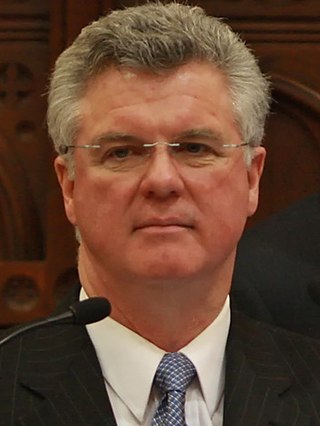
Aetna Inc. is an American managed health care company that sells traditional and consumer directed health care insurance and related services, such as medical, pharmaceutical, dental, behavioral health, long-term care, and disability plans, primarily through employer-paid insurance and benefit programs, and through Medicare. Since November 28, 2018, the company has been a subsidiary of CVS Health.

Mary CarolynRell was an American politician who served as the 87th governor of Connecticut from 2004 to 2011. Rell also had served as the state's 105th lieutenant governor of Connecticut from 1995 to 2004 under Governor John G. Rowland, and became governor after Rowland resigned from office. To date, Rell is the last Republican and last woman to serve as Governor of Connecticut.
Single-payer healthcare is a type of universal healthcare, in which the costs of essential healthcare for all residents are covered by a single public system. Single-payer systems may contract for healthcare services from private organizations or may own and employ healthcare resources and personnel. "Single-payer" describes the mechanism by which healthcare is paid for by a single public authority, not a private authority, nor a mix of both.

Joseph David Courtney is an American lawyer and politician serving as the U.S. representative for Connecticut's 2nd congressional district since 2007. His district encompasses most of the eastern third of the state, including Norwich and New London. A member of the Democratic Party, Courtney served as the Connecticut state representative for the 56th district from 1987 to 1995 and Vernon town attorney from 2003 until 2006.

Dannel Patrick Malloy is an American politician who served as the 88th governor of Connecticut from 2011 to 2019. A member of the Democratic Party, he chaired the Democratic Governors Association from 2016 to 2017. In July 2019, he began his tenure as the Chancellor of the University of Maine System.

The Massachusetts health care reform, commonly referred to as Romneycare, was a healthcare reform law passed in 2006 and signed into law by Governor Mitt Romney with the aim of providing health insurance to nearly all of the residents of the Commonwealth of Massachusetts.
Same-sex marriage has been legally recognized in Connecticut since November 12, 2008 as a result of the Connecticut Supreme Court ruling 4–3 in Kerrigan v. Commissioner of Public Health that the state's statutory prohibition on same-sex marriage violated the Constitution of Connecticut and that the state's civil unions failed to provide same-sex couples with rights and privileges equivalent to those of marriage.
Joan V. Hartley is an American politician. A Democrat, she has been a state senator from Connecticut since 2001.

Christopher G. Donovan is a former American Democratic politician who was elected to be the Speaker of the Connecticut House of Representatives. He was sworn in as Speaker on January 7, 2009, and left his post in 2013, having not sought reelection to the House. He is the first grassroots organizer to become speaker of the Connecticut House.
The Healthy Americans Act(HAA), also known as the Wyden-Bennett Act, is a Senate bill that had proposed to improve health care in the United States, with changes that included the establishment of universal health care. It would transition away from employer-provided health insurance, to employer-subsidized insurance, having instead individuals choose their health care plan from state-approved private insurers. It sought to make the cost of health insurance more transparent to consumers, with the expectation being that this would increase market pressures to drive health insurance costs down. The proposal created a system that would be paid for by both public and private contributions. It would establish Healthy Americans Private Insurance Plans (HAPIs) and require those who do not already have health insurance coverage, and who do not oppose health insurance on religious grounds, to enroll themselves and their children in a HAPI. According to its sponsors, it would guarantee universal, affordable, comprehensive, portable, high-quality, private health coverage that is as good or better than Members of Congress have today; A 2008 preliminary analysis by the Congressional Budget Office concluded it would be "essentially" self-financing in the first year that it was fully implemented.
Michael P. Lawlor is an American politician, criminal justice professor, and lawyer from Connecticut. A Democrat, he served as a member of the Connecticut House of Representatives from 1987 to 2011, representing the 99th district in East Haven. Lawlor resigned from the legislature on January 4, 2011 to serve in Dan Malloy's administration as undersecretary for criminal justice policy and planning at the Office of Policy and Management.
Matthew L. Lesser is an American politician who represents the 9th district in the Connecticut State Senate. A member of the Democratic Party, he was first elected to the State House in 2008, and re-elected in 2010, 2012, 2014, and 2016. He won election to the state Senate from the 9th district in 2018, and was reelected in 2020 and 2022. Lesser unsuccessfully sought the Democratic nomination for Connecticut Secretary of the State in 2022.

Universal Health Care Foundation of Connecticut is an independent, nonprofit organization with offices in Meriden, Connecticut. The foundation supports the mission of its parent organization, CHART. As of 2008, the foundation had assets of approximately $30 million.
The history of health care reform in the United States has spanned many decades with health care reform having been the subject of political debate since the early part of the 20th century. Recent reforms remain an active political issue. Alternative reform proposals were offered by both of the major candidates in the 2008, 2016, and 2020 presidential elections.

Juan A. Figueroa is an American consultant and political activist. He is a principal with Helene Figueroa at Soltaino Consultants, a strategic planning, applied research, advocacy and health philanthropy nonprofit consulting firm recognized for authoring an in-depth study on the health status of immigrants and refugees in the U.S. state of Missouri (2019–present).

Kevin Galvin is a Connecticut-based business activist. He is the founding chair of the Small Business for Health Care Reform advisory committee and is best known for his efforts as an advocate for the interests of small business in the reform of health care systems. Galvin participated in the national health care reform debate that culminated in the passage and signing of the Patient Protection and Affordable Care Act in March 2010. He and his coalition also played a role in the passage of Connecticut's SustiNet health care reform plan in 2009.
Kevin P. Lembo is a Democratic elected official who served as the Connecticut State Comptroller, the statewide elected official responsible for reporting on state finances, administering health care plans for public employees and retirees, and paying the state's bills. He took office on January 5, 2011 and resigned effective December 31, 2021. Lembo is the first openly gay individual to be elected to statewide office in Connecticut.

The coat of arms of Connecticut is an official emblem of the state of Connecticut, alongside the seal and state flag. The General Assembly of Connecticut adopted a design for the official arms of the state on March 24, 1931, which it ordered to be drawn and filed with the Secretary of the State.
Access Health CT is the health insurance marketplace for the U.S. state of Connecticut. Access Health CT will enable people and small businesses to purchase health insurance at federally subsidized rates.

The Save American Workers Act of 2013 is a bill that would change how the Patient Protection and Affordable Care Act defines full-time worker, by raising the threshold for offering employer-provided insurance from a minimum of 30 to 40 work hours a week. This is in order to remove the incentive some companies may have to reduce their employees' hours in order to avoid the employer healthcare mandate.











